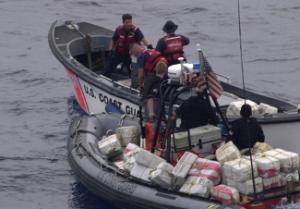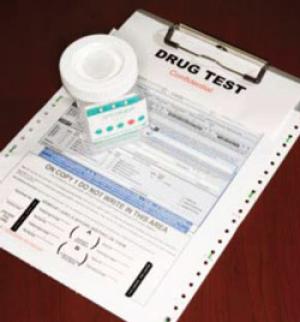As Attorney General Eric Holder prepared to appear before a congressional committee Wednesday, former drug warriors Tuesday called on him to enforce federal marijuana laws. The International Narcotics Control Board chimed in with criticism of legalization, too.
In a case that could have important implications for US drug war tactics abroad, a federal appeals court has thrown out the convictions of four Panamanians tried in the US after being seized on Panamanian territory.
StoptheDrugWar.org needs your support to continue our work during the most important time in drug reform we've ever seen. We have gifts to send you too, with donations of $15 or more.
Support for marijuana legalization is at the highest levels ever recorded by the venerable Field poll, but not high enough to make potential initiative campaigners or contributors relaxed.
Legislatures are in session across the land, and that's reflected in our update this week. Bills are moving, generally, but not, always in the right direction. Meanwhile, Arkansas looks ahead to 2014, and Oakland wants back in the Harborside case.
The Hawaii House earlier this session rejected marijuana legalization; now, it will have a chance to vote on decriminalization after a bill passed the state Senate.
Oregon becomes the latest state to see a marijuana legalization bill this year.
Have you ever worked in an industry where there is drug testing? If so, that's "reasonable suspicion" you are a drug user, according to a public benefits drug testing bill that has passed the Kansas Senate.
The Norwegian government wants to decriminalize heroin smoking as a harm reduction measure in a bid to reduce overdoses.
An Oklahoma City man was killed by undercover police after bumping an officer with his car as he attempted to flee a drug bust. That's the sixth death this year in US domestic drug law enforcement operations.
The Tulsa police corruption scandal is the gift that keeps on giving, Jackson, MS, cops head to prison, and more cops want pills too badly for their own good.
As the nation awaits the Obama administration's response to marijuana legalization votes in Colorado and Washington, Tuesday saw a two-pronged attack on the whole notion. On the one hand, former drug czars and Drug Enforcement Administration (DEA) heads lined up to urge the administration to act now to strangle legalization in its crib, while on the other, the International Narcotics Control Board (INCB) warned that allowing states to legalize would violate international drug control treaties.

"S.O.S." web site celebrates defeat of Hawaii marijuana legalization bill
Legalization supporters rejected the attacks, comparing the ex-DEA chiefs to Prohibition agents seeking to justify their efforts and dismissing the global anti-drug bureaucrats as largely irrelevant.
In a
joint letter under the auspices of the anti-drug reform group
Save Our Society From Drugs, eight former heads of the DEA and four former heads of the
Office of National Drug Control Policy urged the federal government to act now to nullify the votes in Colorado and Washington. The same group similarly called on Attorney General Holder to speak out against those state initiatives last September, but he failed to do so.
Holder, who said last week his decision will be
"coming soon," was scheduled to appear before the Senate Judiciary Committee Wednesday. The retired drug fighters urged senators to press him on the issue.
Holder's actual appearance, though, was anticlimactic.
He told the committee only that he hoped, again, to be able to announce a policy "relatively soon."
That prompted committee chair Sen. Patrick Leahy (D-VT) to hand out some advice of his own. "If you're going to be -- because of budget cuts -- prioritizing matters, I would suggest there are more serious things than minor possession of marijuana, but it's a personal view," Leahy told Holder, adding that more states were sure to follow in Colorado's and Montana's footsteps.
That's not what the drug warriors were telling Holder.
"We, the undersigned, strongly support the continued enforcement of federal law prohibiting the cultivation, distribution, sale, possession, and use of marijuana -- a dangerous and addictive drug which already has severe harmful effects on American society," they wrote. "We also respectfully request your committee at its March 6 hearing to encourage Attorney General Eric Holder to adhere to long-standing federal law and policy in this regard, and to vigorously enforce the Controlled Substances Act (CSA)."
The signatories suggested that senators ask Holder is he still believed in the Supremacy Clause when it comes to conflicts between state and federal law and why he isn't enforcing the Controlled Substances Act in Colorado and Washington. They also suggested asking him "what is being done about our international drug treaty obligations," noting that they require the federal government to enforce marijuana prohibition.
And speaking of international drug treaty obligations, the
INCB, which is charged with ensuring that countries live up to them, also criticized marijuana legalization as it issued its
2012 Annual Report.
Noting the popular votes in favor of legalization in Colorado and Washington,
INCB reiterated that "the legalization of cannabis for non-medical and non-scientific purposes would be in contravention to the provisions of the 1961 Convention as amended by the 1972 Protocol."
The
INCB also took a shot at medical marijuana, noting that "the control requirements that have been adopted in the 17 states in question and in the District of Columbia under the 'medical' cannabis schemes fall short of the requirements set forth in articles 23 and 28 of the 1961 Convention as amended by the 1972 Protocol."
And, also expressing concerns about decriminalization moves,
INCB "requests that the government of the United States take effective measures to ensure the implementation of all control measures for cannabis plants and cannabis, as required under the 1961 Convention, in all states and territories falling within its legislative authority."
The two-pronged attack excited a quick response from drug reform groups and at least one Democratic congressman.
"As Supreme Court Justice Louis Brandeis once observed, states are the laboratories of democracy. The federal government should concentrate on shutting down meth labs -- not the laboratories of democracy. The people of Colorado and Washington voted to implement these laws, and the federal government should respect their will. States have a right to determine their own possession laws," said Rep. Steven Cohen (D-TN) in a Tuesday statement.
"If the people of Colorado and Washington want to legalize small amounts of marijuana, that is their decision. It is arrogant of these former DEA chiefs to encourage the President to nullify these laws," Cohen continued. "The fact that these former DEA chiefs are so focused on marijuana possession is why we have lost the war on drugs. The war should be on heroin, meth, crack, cocaine and unauthorized use of prescription drugs -- not marijuana possession."
[Ed: We don't think war on those other drugs is a good thing either -- to the extent at least that "war" means arresting and incarcerating people. Not that we want underground meth labs all over the place. But meth is going to be supplied by someone in some way, despite enforcement efforts, so long as there are people who want to use it. We're losing the "war on drugs" because it is prohibition based, and prohibition doesn't work. The government's focus on marijuana enforcement only highlights the sheer senseless of it all. -DB]
"The former DEA chiefs' statement can best be seen as a self-interested plea to validate the costly and failed policies they championed but that Americans are now rejecting at the ballot box," said Ethan Nadelmann, executive director of the Drug Policy Alliance. "They obviously find it hard to admit that -- at least with respect to marijuana -- their legacy will be much the same as a previous generation of agents who once worked for the federal Bureau of Prohibition enforcing the nation’s alcohol prohibition laws."
"The war on drugs has been a failure by every measure," said Neill Franklin, the executive director of Law Enforcement Against Prohibition. "After more than a trillion dollars spent over the last forty years, we have nothing to show for it except more violence on our streets, the fracturing of community trust in the police and overflowing prison populations. Still, use has not significantly declined. It's unfortunate the DEA heads can't admit this failure. As someone who gave three decades of his life fighting this 'war' on the ground, I can tell you that from that perspective, this policy was dead on arrival."
"It is not surprising that these ex-heads of the marijuana prohibition industry are taking action to maintain the policies that kept them and their colleagues in business for so long," said Mason Tvert, communications director for the Marijuana Policy Project and an official proponent of the Colorado initiative. "Their desire to keep marijuana sales in an underground market favors the drug cartels, whereas the laws approved in Colorado and Washington favor legitimate, tax-paying businesses. Marijuana prohibition has failed, and voters are ready to move on and adopt a more sensible approach. It's time for these former marijuana prohibitionists to move on too."
As for INCB, it essentially plays the role of toothless nag, said Eric Sterling, the executive director of the Criminal Justice Policy Foundation. It is mandated by the United Nations to report on adherence to global anti-drug treaties, but has only the power to hector, not to enforce.
"The INCB has no power other than to issue reports," he said. "It can't issue indictments, it can't call for a resolution in some other body to condemn a nation. It's strictly hortatory, and for many years, it's bordered on the preposterous in the condemnations it's made. The INCB thinks that nations ought to suppress music or motion pictures or books that 'send the wrong message' about drugs. In that sense, it is completely out of step with Western Civilization. They would reject art and music and probably science if it were contrary to their abstinence focus on drug use."
Not only is the INCB relatively powerless, it is largely irrelevant, Sterling said.
"In our American drug policy, they have only negligible influence," he said. "I don't think that in any state capital, the INCB's comments carry any political weight. I don't think in most journals of opinion, their observations are important. Whether their comments have significance in other countries would be harder for me to assess. I tend to believe they are not that important," he said.
"Most people don't even know what it is or what its power is or what it said, including most members of Congress and their staffs," Sterling continued. "The INCB is obscure. Maybe some former DEA administrators might want to refer to them in a press release, but nobody else is going to pay any attention."
The forces of opposition to marijuana legalization are lining up to put pressure on the Obama administration. It shouldn't listen to them, said DPA's Nadelmann.
"President Obama and Attorney General Holder really need to allow Washington and Colorado officials to implement the new laws in ways that protect public safety and health while respecting the will of those states’ voters," he said. "At this point, insisting on blind obeisance to strict interpretation of federal drug laws will only serve the interests of criminals who want to keep this industry underground and law enforcement officials who want to justify their legacy."
And the wait for clarity from Washington continues...back to top
special to Drug War Chronicle by Clarence Walker, [email protected]
America's war on drugs overseas was dealt a heavy blow in the federal courts late last year. In November, the 11th US Circuit Court of Appeals in Atlanta handed prosecutors a crushing defeat by reversing the multiple drug convictions of four foreign nationals arrested after their fishing vessel with 760 kilos of cocaine was seized off the Panamanian coast three years ago. That cocaine was valued at between $180 million and $200 million.

Coast Guard drug bust, 2004
The defendants were convicted and sent to prison under a never before challenged provision of the federal Maritime Drug Law Enforcement Act. The ruling reversing their convictions has called into question current US war drug tactics on foreign territory and territorial waters.
If upheld, the decision in
US v. Bellaizac-Hurtado, could prevent the US from prosecuting suspected smugglers caught within the 12-mile territorial waters of South and Central America countries, and it may hinder US authorities from entering the 12-mile limit themselves while carrying out anti-narcotics operations. That would wreak havoc with US drug enforcement offensives such as Operation
Martillo (Hammer), which has been aimed squarely at Central America and has so far seized over $2 billion worth of drugs from sea-going vessels.
Federal prosecutors haven't said whether they will appeal, but it would be a surprise if they didn't.
As the justices at the
11th Circuit noted, the
Bellaizac-Hurtado case is the first taken up during modern times to determine whether the "Offenses clause" of the US Constitution can legally allow US prosecution of drug trafficking crimes in another country. The Offenses clause gives Congress the right to "define and punish… Offenses against Law of Nations."
The court found that the use of the clause to justify the prosecution of
Bellaizac-Hurado under the Maritime Drug Law Enforcement Act is illegal because drug trafficking was not a crime under the
Law of Nations when the Constitution was written more than two centuries ago, nor is it a crime under "customary international law" now. The pursuit of felony crimes overseas is limited by customary international law, and the international community has not treated drug trafficking under these premises as a crime, the court held.
"Drug trafficking was not a violation of customary international law during the 'Founding of the US law' and drug trafficking is not a violation of customary international law today," the opinion stated. "Because drug trafficking is not a violation of customary international law, we hold that Congress exceeded its power, under the
Offences Clause, when it proscribed the defendants' conduct in the territorial waters of Panama. And the United States has not offered us any alternative ground upon which the Act could be sustained as constitutional. As applied to these defendants, the Act is unconstitutional, and we must vacate their convictions."
While the ruling found the act could not be used to prosecute suspected drug smugglers arrested within a country's 12-mile territorial waters, it does not impact cases against smugglers using "stateless" submarines, nor impede the ability of US authorities to prosecute felonies committed on "the high seas."
The potentially precedent-setting case began in 2010 when US Coast Guard patrols in Panamanian waters spotted a wooden fishing vessel operating without lights or a flag. Suspicious, the Coast Guard alerted the Panamanian Navy and the chase was on. The Navy officers chased the vessel until the suspects abandoned the ship and fled on land deep into Panama's jungle. Following a thorough search of the vessel the Coast Guard discovered "760 kilos of cocaine." The feds had scored a mother lode. Meanwhile the four occupants of the vessel were arrested the next day in the jungle by Panamanian National Frontier Service.
Through a diplomatic agreement, Panama handed the captured men over to the US for prosecution.They were indicted in Florida's Southern District in Miami for conspiracy and possession with intent to distribute five kilograms or more of cocaine aboard a vessel subject to US jurisdiction under the Maritime Drug Law Enforcement Act.
They were convicted and sentenced to federal prison. Their attorneys, led by Miami defense attorney Tracey
Dreispul, appealed. The Maritime Drug Law Enforcement Act was unconstitutional because it exceeded Congress' constitutional powers under the Offenses Clause, they argued.
The Justice Department responded that "drug trafficking is an offense against 'Law of Nations' as applied to the defendants' conduct -- -subject to Universal Jurisdiction because when Congress enacted the Maritime Drug Law Enforcement Act, it stated that drug trafficking is 'universally condemned' and a threat to the security and societal well-being of the United States." Prosecutors also argued that "the US federal district court had lawful jurisdiction over the cocaine because the defendants had been operating a vessel without a flag or national identification, and that the Panamanian government consented to have the men prosecuted in the United States."
But the appeals court in Atlanta wasn't buying it. "Offenses against Laws of Nations can only be interpreted in accordance with principles of customary international law because international law proscribes which conduct may be punished as an Offense against the Laws of Nations," the court held.
In other words, Congress doesn't get to define what constitutes customary international law.
"Where does the government get off on by prosecuting people they don't have the power to prosecute?" asked attorney Stephen
Leckar, counsel for the defense in the landmark US v. Antoine Jones GPS drug trafficking case, in an interview with the Chronicle. "Where is the evidence that the drugs were headed for the US market to be distributed?"
"This basically was a Panamanian internal matter and their government is saying 'United States, you clean this up for us,'" Miami lawyer Phillip Horowitz, who represented one of the defendants, told the
Miami Herald.
The ruling could have a cascading effect, impacting some of the thousands of drug smuggling cases stemming from offshore arrest. Legal experts predict that if the ruling withstands appeal, other convicted drug smugglers may go free if they, too, were arrested in foreign territorial waters by international police, then turned over to US for prosecution under "
Offences against Laws of Nations."
Those defendants need to act, though, said Florida defense attorney David Silverstein. "Any defendants convicted under the same set of facts in
Bellaizac-Hurtado must file a writ of habeas corpus within two years after the opinion was issued," he told the Chronicle.
With their convictions now voided, it remains to be seen if
Bellaizac-Hurtado and his codefendants will now be prosecuted by Panamanian authorities. If so, let's hope they get credit for time served. Luis Carlos
Hurtado did 25 months, Pedro
Angulo-Rodallega and
Albeiro Gonzales did 36 months, and
Yimmie Bellaizac-Hurtado is still doing his 90-month sentence pending resolution of the appeals. The others have been deported.
back to top
Dear friend,
StoptheDrugWar.org needs your help to continue our programs -- like this newsletter,
Drug War Chronicle -- during the most important time in the drug reform cause that there has ever been.
Click here for some examples of how activists around the world rely on
Drug War Chronicle in their work.
As our thanks for your support, we continue our full set of membership offers, some of them available with donations of $15 or greater to our organization.
The newest item is a pair of reports that highlight the US and international legal landscapes as legalization becomes a mainstream issue. Though the text of each report can be found online, for $15 or more you can hold the nice printed copies -- the history in the making -- in your hands. We will send you one each of both of these reports, for just one $15 or greater donation:- "On the Limits of Federal Supremacy: When States Relax (or Abandon) Marijuana Bans," a Cato Institute Policy Analysis by Vanderbilt law professor Robert Mikos, explores the limits in federal law and resources for enforcing marijuana prohibition in states that have legalized.
- "Governing The Global Drug Wars," a special report by London School of Economics IDEAS, details the history of the global prohibition regime; the obstacles it poses to nations seeking to explore legalization and other reforms, and efforts by nations and agencies to transform the system into one respecting public health and human rights.
We are also pleased to continue offering the following items (while supplies last), now also with donations of $15 or more:
- Emperor of Hemp DVD, about the life and work of Jack Herer (memorial tribute edition)
- StoptheDrugWar.org strobe light
- StoptheDrugWar.org stamp and ink pad
- StoptheDrugWar.org mouse pad
Though we offer these items for $15, I hope you will consider making a larger donation if you can, or supplementing your initial gift with a monthly one. If the gifts are not important to you, I hope you'll consider sending a donation that's just for our work.
Donations can be tax-deductible, supporting our educational work, or non-deductible, supporting our lobbying work. (Note that selecting any gift items reduces the amount of your donation that is deductible -- which with a smaller gift amount can be most of it.) They can be made online on our web site by credit card or PayPal, or sent by mail to P.O. Box 18402, Washington, DC 20036. If you are donating by check, please make it payable to DRCNet Foundation (if tax-deductible) or Drug Reform Coordination Network (if not deductible).
If you wish to donate stock, the information to give your brokerage is Ameritrade, (800) 669-3900), DTC #0188, and account number 781926492 for tax-deductible gifts or 864663500 for non-deductible gifts -- please make sure to contact us if donating in this way.
Thank you for standing with us to stop the drug war's cruelties and meet the opportunity this time offers to make a brighter future. As recent events show: Time, and the truth, are on our side!
Sincerely,

David Borden, Executive Director
StoptheDrugWar.org
Washington, DC
http://stopthedrugwar.org
back to top
A Field poll of California voters released Wednesday had support for marijuana legalization at 54%, the highest number ever for a Field poll. Only 43% opposed legalization. The same poll reported that two-thirds of Californians want the federal government to end its crackdown on medical marijuana providers.
While the 54% in favor of legalization is the highest ever for Field, it is not high enough to make potential initiative organizers or contributors feel sanguine. The conventional wisdom about initiative experts is that they should be polling at 60% or above at the beginning of the campaign. However,
it will be a few years before Californians are likely to vote on legalization again, and
support for legalization has only continued to increase in recent years.
Proposition 19 in 2010 typically polled in the
50s in the run-up to the election last year before losing on election day with 47% of the vote. That year, the final Field poll to ask about marijuana legalization, four months ahead of the election, had support at 50%, but as is typical in initiative campaigns, support wavered at the end.
This week's Field poll found support for legalization at 60% or above for San Francisco Bay Area residents (66%), single people (64%), men (62%), voters under 40 (60%), and African- and Asian-Americans (60%).
Support was lowest among Latinos (41%), Republicans (42%), voters 65 and older (43%), and women (46%).
Californians strongly support their medical marijuana system, the poll found. In addition to the 67% calling on the federal government to end its crackdown, 72% said they favor the state's medical marijuana law. That figure, however, was down two points from 2004 and 2010 Field polls.
Some 58% of respondents would allow dispensaries in their communities. Support for dispensaries was highest in the Bay Area (65%) and lowest in "other Southern California" (San Diego, the Inland Empire and Central Valley).
back to top
Legislatures are in session across the land, and that's reflected in our update this week. Bills are moving, generally, though not always in the right direction. Meanwhile, Arkansas looks ahead to 2014, and Oakland wants back in the Harborside case. Let's get to it:
Arkansas
Last Monday,
activists submitted a medical marijuana ballot initiative to the state attorney general's office. Arkansans for Medical Cannabis plans to try again in 2014 after their 2012 initiative surprised just about everybody by coming up just short with 49% of the vote.
California
Last Wednesday,
the city of Oakland filed notice that it will appeal a federal magistrate's decision to dismiss its lawsuit in support of
Harborside Health Center in its ongoing battle with the federal government. Oakland sued after federal prosecutors moved to seize the property where
Harborside is located.
Also last Wednesday,
Butte County prosecutors dropped charges against a dispensary operator in the wake of Fourth District Court of Appeal's reversal of the conviction of San Diego dispensary operator
Jovan Jackson. That decision held that members of a collective do not need to actually work growing plants. Prosecutors said they were dropping a case against dispensary operator Rick
Tognoli because the Jackson ruling "has made it almost impossible to prosecute dispensaries that are disguised as collectives and making supposedly no profit."
Hawaii
On Tuesday,
the House passed two medical marijuana bills. House Bills 667 and 668 are designed to improve the state's existing medical marijuana program. They now go before the state Senate.
Iowa
On Monday,
a medical marijuana bill was pronounced dead even though it was approved by a Senate subcommittee. The chairman of the subcommittee, Sen. Joe
Bolkom (D-Iowa City), said the bill is unlikely to advance because it lacks support in the full committee. A similar bill was rejected by a House subcommittee earlier this session.
Illinois
On Wednesday,
a medical marijuana bill won a House committee vote. The bill, House Bill 1, passed the House Health and Human Services Committee on an 11-4 vote and now goes before the full House. Qualified patients would be able to obtain marijuana from one of up to 60 dispensaries, which would acquire marijuana from up to 22 cultivation centers. The Illinois Department of Agriculture, Department of Health, and Department of Financial & Professional Regulation would regulate the cultivation, acquisition, and distribution of marijuana.
Montana
Last Thursday,
two minor players in a dispensary were sentenced to time served by a federal judge. Doran Leslie Hewitt had kept patient records and Travis
Birdinground had delivered medical marijuana to patients. They had worked for Eastern Montana Cannabis. The judge in the case has sentenced all five Eastern Montana Cannabis defendants to terms shorter than the federal guideline ranges.
New Jersey
On Monday,
a Senate committee approved a bill to protect medical marijuana patients on organ transplant lists. The bill would ensure that a person's use of medical marijuana would not prohibit him from receiving needed medical care, including organ transplants. It was approved by the Senate Health, Human Services and Senior Citizens Committee. The bill, S-1220, would provide that a registered, qualifying patient's authorized use of medical marijuana would be considered equivalent to using other prescribed medication rather than an illicit substance and therefore would not disqualify the person from needed medical care, such as an organ transplant. It now heads to floor vote in the Senate.
Oregon
Last Thursday,
a bill that would add PTSD to the list of qualifying debilitating medical conditions passed the Senate Health and Healthcare Committee. It now goes before the Senate Judiciary Committee. Senate Bill 281 passed out of committee on a 4-1 vote.
back to top
The Hawaii Senate Tuesday voted unanimously to decriminalize the possession of small amounts of marijuana. The measure now goes to the House.

Hawaii State Capitol (wikimedia.org)
The bill,
Senate Bill 472, would make possession of up to an ounce a civil infraction with a maximum $1,000 fine. The bill originally called for a maximum $100 fine, but was amended by lawmakers who said they wanted to emphasize that marijuana would still be illegal.
Bill supporters said it was aimed at reducing congestion in the state's criminal justice system.
Earlier this session, the House defeated a marijuana legalization bill. Whether it will embrace decriminalization remains to be seen.
The bill is being supported by a newly formed group,
Fresh Approach Hawaii, which aims at lobbying the legislature on marijuana reform issues. The group said it will work with House members to reduce the fine and add other desirable provisions.
back to top
A bill that would legalize marijuana possession and create a state-regulated system of legal marijuana commerce was introduced in the Oregon legislature Monday. That makes Oregon the eighth state to either see such a bill this year or have one pending. The others are Hawaii (already dead), Maine, Massachusetts, New Hampshire, Pennsylvania, Rhode Island, and Vermont.
House Bill 3371, also known as the Control, Regulation and Taxation of Cannabis Act was introduced by the House Committee on Revenue. As of Friday, it had yet to be assigned to a committee and was at the Speaker's desk.
The bill would legalize the possession of up to six plants and 24 ounces of marijuana "on the premises" of non-commercial home grows. The bill does not otherwise set possession limits, but leaves them to the Oregon Health Authority to regulate.
The bill would also direct various state agencies to regulate, control, and tax marijuana commerce, with the tax set at $35 an ounce. Marijuana commerce would include "edibles." The bill would also legalize industrial hemp.
Last year, a marijuana legalization initiative, Measure 80, was defeated at the polls, gaining
46.3% of the popular vote. Oregon activists are currently debating whether to move forward with another initiative in 2014 or wait for the next presidential election in 2016. [
Ed: Presidential years are considered more favorable with respect to the type of voter turnout.] But
Oregonians need not have to wait even until 2014, if the legislature acts on
HB 3371.
back to top
The Kansas Senate Thursday approved a bill requiring welfare and unemployment benefits recipients to undergo drug tests if there is "reasonable suspicion" they are using drugs. But the definition of "reasonable suspicion" includes having worked in a field where drug testing is prevalent.
Democratic legislators successfully amended the bill so that its provisions also include lawmakers.
The Republican-backed bill, Senate Bill 149, passed on a 31-8 vote, largely along party lines.
According to the bill, reasonable suspicion may be arrived at, but is not limited to, "an applicant's or recipient's demeanor, missed appointments and arrest or other police records, previous employment or application for employment in an occupation or industry that regularly conducts drug screening, termination from previous employment due to unlawful use of a controlled substance or controlled substance analog or prior drug screening records of the applicant or recipient indicating unlawful use."
People who fail the drug test would lose benefits until they complete drug treatment and job training programs.
Republicans argued that the bill would help people with addictions kick their habit and prevent state tax dollars from being spent on drugs. But according to a legislative fiscal analysis, the bill would create "a net fiscal effect of increased expenditures of $1,095,468 in FY 2014" and create no net benefit to state coffers in years after that.
The bill now goes before the state House.
back to top
The Norwegian government said Friday it wants to decriminalize the smoking of heroin as a harm reduction measure, Agence-France Presse reported. Smoking heroin is less dangerous than injecting it, and the move could reduce the number of overdoses, officials said.

heroin smoking image from 1965 UNODC newsletter
"The number of fatal overdoses is too high and I would say it's shameful for Norway," said Health Minister Jonas
Gahr Stoere. "The way addicts consume their drugs is central to the question of overdoses. My view is that we should allow people to smoke heroin since injecting it is more dangerous," he said.
According to the
Norwegian Institute for Alcohol and Drug Research (
SIRUS), heroin overdoses accounted for 30% of 262 fatal overdoses in 2011. By comparison, only 168 people died in traffic accidents that year.
The city of Oslo has opened a supervised injection site in a bid to reduce overdoses, but decriminalizing heroin smoking would also help, said
Stoere. Users currently can't smoke at the supervised injection site.
"This isn't about some kind of legalization of heroin but about being realistic," he said. "Those who are in the unfortunate situation of injecting themselves in a drug room should be able to inhale. It is less dangerous, you consume less and the risk of contracting a disease is lower," he added.
"It's a paradox that you can't smoke heroin when you can inject it, since the first method is less dangerous than the second,"
SIRUS researcher Astrid
Skretting told AFP. "But the culture of injecting which provides a more immediate effect than smoking seems deeply rooted in Norway and it's not certain that a decriminalization will lead to a radical change in behavior," she suggested.
The Norwegian government is set to unveil its latest plan for fighting drug addiction next week.
Stoere said the heroin smoking
decrim plan has the backing of the center-left government.
back to top
An undercover police officer shot and killed an Oklahoma City man while attempting to arrest him after observing a suspected drug deal Friday. Marcus Dewayne Patterson, 35, becomes the sixth person to die in US domestic drug law enforcement operations so far this year.
According to the
Oklahoman, relying on police accounts, Oklahoma City police were called to a convenience store about noon Friday because of reported "narcotics activity." Officers witnessed a drug deal, and three officers and a supervisor, all in plain clothes, drove unmarked police cars toward Patterson, who was in his car, according to
Capt. Dexter Nelson.
Another plain clothes officer,
Sgt. Charles
Schamel, approached the vehicle on foot from the side and was struck by the car as Patterson attempted to flee the scene. As he rolled over the hood of the car,
Schamel fired his weapon.
"That officer then fired on the man in the car, killing him," Nelson said. "A car can be used as a weapon anytime you are standing in front of a car and someone comes toward you."
Schamel was treated at the scene for bumps and bruises.
When investigators examined Patterson's body, they found a 9 mm hand gun tucked into his waistband, but police said he apparently never drew the weapon.
Two men in the car with Patterson were arrested at the scene and charged with felony murder. They got hit with that because police charged they were in the act of committing a felony when Patterson's killing took place.
back to top
The Tulsa police corruption scandal is the gift that keeps on giving, Jackson, MS, cops head to prison, and more cops want pills too badly for their own good. Let's get to it:

pile-of-cash_104.jpg
In Boston,
a former Watertown police officer was arrested Tuesday on charges he stole a drivers' license and used it to fraudulently obtain
oxycodone and other controlled substances. Joseph
Deignan, 57, is charged with unlawful possession of a controlled substance by fraud and fraud in connection with identification documents.
Deignan was working as the Watertown Police traffic supervisor when he allegedly stole the drivers' license. He's looking at up to 15 years in federal prison on the identity theft count.
In Stillwater, Minnesota,
a now former Washington County deputy was arrested last Wednesday for allegedly stealing drugs deposited in a drug "take-back bin." Ricky Gruber, 43, is charged with drug possession, theft, and misconduct of a public officer. He went down after a sheriff's sergeant noticed the bin had been tampered with, and subsequent video surveillance caught him opening the bin and removing drugs. Gruber admitted he took the drugs for "personal use" and said he had been researching a medical condition present during "sexual intimacy." He said he took the drugs to help with his medical condition.
In Tulsa, Oklahoma,
a former Tulsa police officer was held in contempt last Wednesday for giving false testimony related to a Tulsa police corruption case. Jeff Henderson got an additional three months added to his 42-month sentence after being convicted in 2011 on six counts of perjury and two counts of civil rights violations. He had been brought back to Tulsa in June to testify in the case of one of the people railroaded into prison by corrupt Tulsa police, but was found to have lied about who his informant was in that case. Two other Tulsa police officers and a federal agent have been convicted in the Tulsa corruption case, 46 wrongfully convicted people have been released from prison or had their cases modified, and at least 14 lawsuits have been filed against the city and individual police officers.
In Jackson, Mississippi,
three former Jackson police officers were sentenced last Friday for accepting bribes from FBI undercover agents posing as drug traffickers. Monyette Quintel Jefferson, 27, and Terence Dale Jenkins, 25, got 10 years each, and Anthony Ricardo Payne, 25, got nine years. All three pleaded guilty last fall. They had accepted bribes ranging from $10,000 to $20,000 to protect what they thought were cocaine shipments.
back to top











